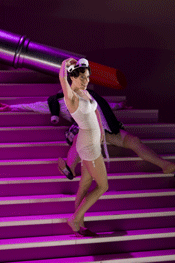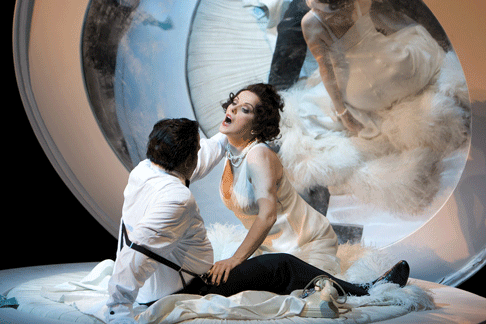In 15 years, *Powder Her Face* has gone from new music cult hit to an opera of international significance. *The Tempest* notwithstanding, it’s AdËs’s finest work. He’s gone on to fame, fortune and Los Angeles, but hasn’t quite recaptured the vitality of his early work. More recently, he’s revisited *Powder Her Face*, writing a suite based on it, so maybe that will reinvigorate his creative juices.
So cherish this wonderful production directed by Carlos Wagner. The production is every bit as much of a star as the Duchess of Argyll, who inspired the opera in the first place. In 1963, she appeared naked, but for a string of pearls, in photos which caused a scandal, because she was performing on naked men (one of whom was later revealed as Douglas Fairbanks Jr.)
“In your face” is probably an indelicate term to use in the circumstances, but it describes the magnificent staging well. There’s no way round the fact that the Duchess was destroyed by hypocrisy. In the small space of the Linbury Studio, Conor Murphy’s giant staircase overwhelms, but that’s the point: there’s no escape! It’s a brilliant piece of theatre in itself, because it changes character in each scene. In the end, Paul Keogan’s lighting turns it into a lurid neon sunset, the perfect coda to the Duchess’s life.
 Rebecca Bottone as Mistress
Rebecca Bottone as Mistress
The stairs also mean the cast can go up and down using the whole performance space, overcoming the cramped limitations of the small stage. Perhaps that’s a reverse metaphor for the Duchess, too. With her wealth and beauty she could have lived a charmed life, if she’d conformed. Instead she grabbed life greedily, imbibing to the full. The headless men in the notorious photos got away scot-free, as did the philandering, brutish Duke, but the Duchess’s reputation was destroyed. Defiant to the end, she cocoons herself away from a world that’s changing in ways she can’t understand (“Buggery, legal?” she exclaims.) Her end is sordid, but she keeps her dignity, at least in delusion. Larger than life personalities just don’t fit in grubby society.
The music’s remarkably inventive. Saxophones and jazzy clarinets evoke the glamour of 1930’s London. “They don’t know how to do parties now,” she wistfully tells a young reporter. AdËs’ does luscious elegance, but undercuts it with sharp, dissonant edges. The luxury is illusion. Debutante balls were a meat market for the upper classes, nothing romantic. The Duchess buys sex from a waiter. “You can get anything with money,” she cries. But others have more money, and more power. The Courts condemn her, to the prurient delight of the “lower” class, represented by Bottone and Paton in dirty macs. And when the money runs out, the Duchess is evicted.
 Iain Paton as Waiter and Joan Rodgers as Duchess
Iain Paton as Waiter and Joan Rodgers as Duchess
AdËs weaves elusive sounds into his orchestra. At the beginning of the second Act, he starts with solo accordion, played in a mysterious, bluesy fashion.. It makes an excellent bridge between past and present. Later, accordion, harp and piano (AdËs’s instrument and “voice”) combine, wheezing, wailing and tensely staccato percussive blasts. It’s surreal, like hearing the ghosts of the past dancing in Hell. At the end, sinister cracks and whirrs are heard. They’re the sound of fishing rods being reeled in. Like a fish, the Duchess has been caught and dies.
The opera is both diamond hard and brittle, but then, that’s the subject. The Duchess wasn’t a nice person even though she was a product of the circles she moved in, and the men around her are worse. Her sexuality is compulsive, and fundamentally unerotic. (It’s the role, not Rodger’s portrayal, which is superb.) Perhaps the maid gets more fun. Bottone’s high-pitched shrieks at the top of her register (an AdËs’ trademark) are well deployed. She’s the voice of anarchy. Her voice rips apart the silky surface of propriety.
Anne Ozorio
image=http://www.operatoday.com/%C2%A9BC20080607158-JOAN-RODGERS.gif
image_description=Joan Rodgers as the Duchess [Photo by Bill Cooper courtesy of the Royal Opera House]
product=yes
product_title=Thomas AdËs: Powder Her Face
product_by=Joan Rodgers: the Duchess, Alan Ewing, Iain Paton, Rebecca Bottone (multiple roles), Timothy Redmond (conductor), Royal Opera House Orchestra and guest artists. Carlos Wagner (director), Conor Murphy (designs), Paul Keogan (lighting) Tom Baert (choreography). Linbury Studio Theatre, Royal Opera House, London. 26th April, 2010.
product_id=Above: Joan Rodgers as the Duchess
All photos by Bill Cooper courtesy of the Royal Opera House